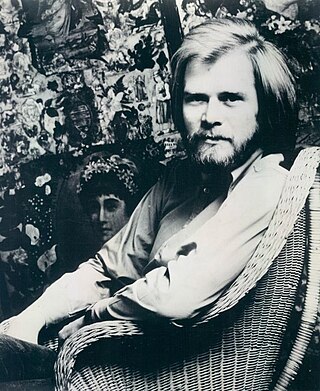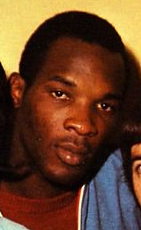
John William "Long John" Baldry was an English musician and actor. In the 1960s, he was one of the first British vocalists to sing the blues in clubs and shared the stage with many British musicians including the Rolling Stones and the Beatles. Before achieving stardom, Rod Stewart and Elton John were members of bands led by Baldry. He enjoyed pop success in 1967 when "Let the Heartaches Begin" reached No. 1 in the UK, and in Australia where his duet with Kathi McDonald, "You've Lost That Lovin' Feelin'", reached No. 2 in 1980.

The Foundations were a British soul band who were primarily active between 1967 and 1970. The group's background was West Indian, White British and Sri Lankan. Their 1967 debut single "Baby Now That I've Found You" reached number one in the UK and Canada, and number eleven in the US. Their 1968 single "Build Me Up Buttercup" reached number two in the UK and number three on the US Billboard Hot 100. The group was the first multi-racial group to have a number one hit in the UK in the 1960s.
Tony Macaulay is an English author, composer for musical theatre, and songwriter. He has won the British Academy of Songwriters, Composers and Authors Award twice as 'Songwriter of the Year'. He is a nine time Ivor Novello Awards winning songwriter. In 2007, he became the only British person to win the Edwin Forrest Award for outstanding contribution to the American theatre. Macaulay's best-known songs include "Baby Now That I've Found You" and "Build Me Up Buttercup" with The Foundations, "(Last Night) I Didn't Get to Sleep at All," as well as "Love Grows " and "Don't Give Up on Us".

The Paper Dolls were a late 1960s British female vocal trio from Northampton, comprising lead vocalist Susie 'Tiger' Mathis, Pauline 'Spyder' Bennett and Sue 'Copper' Marshall. They were one of the few British girl groups of the late sixties.

"Baby, Now That I've Found You" is a song written by Tony Macaulay and John Macleod, and performed by the Foundations. Part of the song was written in the same bar of a Soho tavern where Karl Marx is supposed to have written Das Kapital. The lyrics are a plea that an unnamed subject not break up with the singer.

Clem Curtis was a Trinidadian British singer, who was the original lead vocalist of sixties soul group the Foundations.
Pickettywitch was a British pop group. Fronted by singer Polly Brown, with Chris Warren as the secondary lead singer. The group became best known for its hit single, "That Same Old Feeling", which was written by Tony Macaulay and John Macleod. It reached number five in the UK Singles Chart in 1970.
Colin Young is an English singer who led Joe E. Young & The Toniks in the 1960s. He is mainly known for being a member of the British soul band the Foundations. He also led a progressive rock band and was part of a hit making dance band of the 1980s.

Mike Elliott is a Jamaican-born British saxophonist. He played on ska recordings in the early 1960s and on pop and soul music hits in the late 1960s. He is best known as a co-founding member of the British band The Foundations, and played on their hit singles "Baby, Now That I've Found You" and "Build Me Up Buttercup".
"We Are Happy People" was a top 5 hit in Scandinavia for Swedish group Slam Creepers’ also known as The Slams It was written by trombonist Eric Allandale and made its first appearance as the B-side of The Foundations third single, the minor hit and Tony Macaulay and John Macleod composition "Any Old Time You're Lonely Or Sad". It was re-recorded by the Foundations in 1968, this time with Colin Young on vocals and appeared on their 1968 LP released on Marble Arch MALS 1157. By April 1969 it had been recorded by nine different artists.
"Back on My Feet Again" is the second single released by the Foundations. It was the follow-up to their hit single "Baby, Now That I've Found You". It was written by Tony Macaulay and John MacLeod and produced by Tony Macaulay. It charted at number 18 in the UK and also in Ireland. It reached No. 59 in the U.S. and number 29 in Canada.
John Macleod is a Canadian-born English songwriter and musician. he co-wrote the hits "Baby, Now That I've Found You" for The Foundations, "Let the Heartaches Begin for Long John Baldry, "Heaven Knows I'm Missing Him Now" and many more.

"That Same Old Feeling" is the title of a pop song composed by John Macleod and Tony Macaulay which in 1970 was a Top Ten UK hit for Pickettywitch, an English band fronted by Polly Brown. In the US the Pickettywitch single vied with a rival version by The Fortunes, with both versions scoring well-enough regionally to reach the Top 70 of the Hot 100, the national hit parade maintained by Billboard magazine.
My Little Chickadee is a song written by Tony Macaulay and John Macleod. It was a hit for The Foundations in 1969 and has been covered by Geno Washington & the Ram Jam Band and other artists.

"La bambola" is an Italian pop song written by Franco Migliacci, Bruno Zambrini and Ruggero Cini, and performed by Patty Pravo. The song had been previously refused by several artists, including Gianni Morandi, Little Tony, Gigliola Cinquetti, Caterina Caselli and The Rokes.
"Something Here in My Heart (Keeps A Tellin' Me No)" was a top 20 hit in the UK Singles Chart for the Paper Dolls in 1968.

Digging the Foundations is the final studio album by English soul group the Foundations. The album includes two of the group's hits, "In the Bad, Bad Old Days" and "My Little Chickadee". The album was released in the UK on the Pye label in 1969. There would be various issues relating to the album that would be a cause of concern for the group.

From the Foundations is the debut album by the English soul group the Foundations, released in November 1967 by Pye Records. It contains their hit, "Baby Now That I've Found You".
David Myers is an English songwriter who has written songs for artists such as Dalston Diamonds, The Foundations, Linda Kelly, Billy Ocean, Rainbow, Sonny Reeder, Clodagh Rodgers, and Johnny Tudor. His greatest hit success was with "Jack in the Box".
Baby, I Couldn't See was a 1969 single for The Foundations. It enjoyed some popularity in the Netherlands there where it was a chart hit. It has been recorded by a number of other artists in the early 1970s which include, a number of South American acts, a Mexican band, and a New Zealand band.










